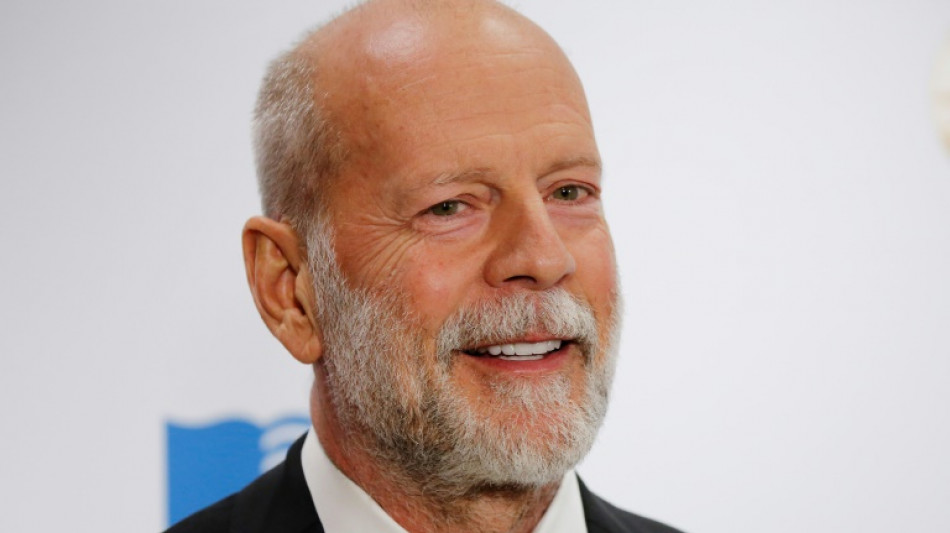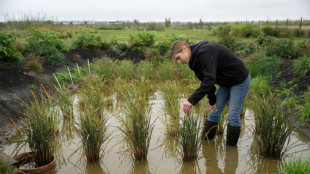
-
 Cricket falls silent across Australia after teenager killed by ball
Cricket falls silent across Australia after teenager killed by ball
-
Vinicius Junior in the clear over Clasico outburst

-
 UK welcomes king's move to strip Andrew of royal titles
UK welcomes king's move to strip Andrew of royal titles
-
Liverpool must snap losing 'habit', says under-fire Slot

-
 Bencic out of Hong Kong last eight as tennis injury list mounts
Bencic out of Hong Kong last eight as tennis injury list mounts
-
Xi invites Canada PM to China in first meet in 8 years

-
 Chinese defence minister seeks 'trust' with US but cautions over Taiwan
Chinese defence minister seeks 'trust' with US but cautions over Taiwan
-
India's Rodrigues beat anxiety and tears to become World Cup star

-
 China, Canada leaders hold first formal talks since 2017
China, Canada leaders hold first formal talks since 2017
-
Nvidia to supply 260,000 cutting-edge chips to South Korea

-
 Camels replace cows as Kenya battles drought
Camels replace cows as Kenya battles drought
-
Endangered across west Africa, leopards thrive in I.Coast reserve

-
 Risky gold rush drives young into Ivory Coast nature park
Risky gold rush drives young into Ivory Coast nature park
-
Deadly roads block mothers from care in jihadist-hit Nigeria

-
 Pillaged I.Coast nature reserve on the mend after crisis decade
Pillaged I.Coast nature reserve on the mend after crisis decade
-
India savours 'greatest day' after Women's World Cup heroics

-
 Why emboldened Kim had little need for photo-op with Trump
Why emboldened Kim had little need for photo-op with Trump
-
In the black: the business of mourning Thailand's queen mother

-
 Tributes as death of Australian teenager touches cricket world
Tributes as death of Australian teenager touches cricket world
-
Jackson throws four TD passes as Ravens rout Dolphins

-
 NBA champs Thunder roll past Wizards, Bucks and Spurs win
NBA champs Thunder roll past Wizards, Bucks and Spurs win
-
UK's Andrew in freefall, stripped of queen's protection

-
 Real Madrid and Barcelona aim to shake off Clasico consequences
Real Madrid and Barcelona aim to shake off Clasico consequences
-
Ambitious Paris FC making steady progress after landing in big time

-
 Rebuilt Leverkusen hope to reignite Bundesliga rivalry at Bayern
Rebuilt Leverkusen hope to reignite Bundesliga rivalry at Bayern
-
Xi primed to meet Japan, Canada leaders after Trump summit

-
 Australia coach Schmidt pleads for Edmed patience ahead of England clash
Australia coach Schmidt pleads for Edmed patience ahead of England clash
-
Liverpool feel pressure to end 'crisis' run, Man City test Bournemouth limits

-
 Farrell eyes 'reset' as Ireland-All Blacks ready for 'Battle of Chicago'
Farrell eyes 'reset' as Ireland-All Blacks ready for 'Battle of Chicago'
-
Asia markets mostly up on heels of Apple, Amazon earnings

-
 Jones wants Japan to enhance 2015 legacy against South Africa
Jones wants Japan to enhance 2015 legacy against South Africa
-
Growing rice in the UK 'not so crazy' as climate warms

-
 Australia say 'let ourselves down' after India end world domination
Australia say 'let ourselves down' after India end world domination
-
AI cannot make cinema, director Linklater says

-
 After delays, Egypt set for lavish opening of grand museum
After delays, Egypt set for lavish opening of grand museum
-
What we know about the downfall of Andrew, born a UK prince

-
 Desperate Dodgers mull using Ohtani as relief pitcher
Desperate Dodgers mull using Ohtani as relief pitcher
-
Blue Jays vie to close out sputtering Dodgers in World Series

-
 Indigenous Australians celebrate historic state treaty
Indigenous Australians celebrate historic state treaty
-
Caught between Venezuela and US, Trinidad fishermen fear the sea

-
 Latest NFL Chiefs-Bills duel has both chasing division leaders
Latest NFL Chiefs-Bills duel has both chasing division leaders
-
Sierra Leone chases rare repeat in Breeders' Cup Classic

-
 King Charles strips Andrew of royal titles, Windsor home
King Charles strips Andrew of royal titles, Windsor home
-
Sales of 'services' help Apple beat earnings forecasts

-
 Beyond words: '67' crowned 'Word of the Year'
Beyond words: '67' crowned 'Word of the Year'
-
Amazon shares surge as AI boom drives cloud growth

-
 Brazil boasts drop in deforestation ahead of UN climate talks
Brazil boasts drop in deforestation ahead of UN climate talks
-
Russians marking Stalin's repression warn against return to past

-
 Stocks mostly fall as investors digest Trump-Xi talks, earnings
Stocks mostly fall as investors digest Trump-Xi talks, earnings
-
Turkey says Pakistan-Afghanistan talks to resume


What to know about aphasia, Bruce Willis' diagnosis
The news that film star Bruce Willis has retired from acting due to aphasia has shone a spotlight on the poorly understood communication disorder.
Here's what you should know.
- What is aphasia? -
"Aphasia just means that someone has a problem with language that they weren't born with," Hugo Botha, a neurologist at Mayo Clinic in Minnesota explained.
The most common cause is stroke or head injury -- and experts stress that while it can affect the production and comprehension of both speech and written words, it normally doesn't impact intelligence.
It affects some two million Americans, according to the National Aphasia Association, making it more common than Parkinson's Disease, cerebral palsy or muscular dystrophy.
A 2016 survey carried out by the same group found that fewer than nine percent of people knew what was.
While it's normally caused by a specific one-time event such as stroke, "there are other possibilities, such as from a neurodegenerative disease," or a growing tumor, explained Brenda Rapp, a cognitive scientist at Johns Hopkins University.
In such cases the damage is progressive and therapy focuses on preventing further loss of function.
Willis' family did not share the cause of his diagnosis in their statement.
- What are the different forms? -
The brain system governing language is a "very complex machine" that involves selecting the right words, moving the mouth appropriately to vocalize them, and on the other end hearing and decoding their meaning, said Rapp.
Everyone occasionally struggles to find the right word, "but you could imagine in aphasia, this happens a lot," she added.
Doctors sometimes split aphasia into broad clinical categories which correlate to where in the brain injury occurred.
In expressive aphasia, people "usually understand fairly well but have trouble getting words out," said speech pathologist Brooke Hatfield, of the American Speech-Language-Hearing Association (ASHA).
A person with this type of aphasia might use simple sentences like "want food" to be understood.
In receptive aphasia "the words come easily, but they might not be the right words. And it's difficult for that person to understand what they're hearing," added Hatfield.
Global aphasia has components of expressive and receptive.
- Speech therapy -
The good news, says Hatfield, is people can improve over the long term.
"There are people who had their stroke 30 years ago, who still work at their language and communication and they still make gains."
The brain is extremely plastic, and speech therapy can engage other parts of it to "bypass the roadblocks" of the damaged areas, and forge new connections, said Rapp.
Such therapy also teaches people to talk around the subject if they get stuck on a specific word.
Family members can also develop strategies to make themselves better understood: "Things like shorter sentences, and making sure that you're talking to the person in full view instead of the other room, and minimizing background noise," said Botha.
Some people do well with assistive devices because their ability to write isn't affected in the same way.
Over the horizon, there are experimental treatments that combine electrical stimulation of the brain with speech therapy that have shown promise in recovering function, said Rapp.
In the case of progressive aphasia, developing drugs that target the build up of protein plaques and tangles in the brain that cause neurodegenerative disease are thought to be the way forward.
- Bottom line -
All the experts emphasized patience. Aphasia can be frustrating and isolating, because "our relationships with others depend so much on being able to talk to them and communicate with them," said Rapp, leading to a person or their caregivers withdrawing.
"It's similar to all of a sudden waking up in a country where you don't speak the language," said Hatfield, rather than a change in underlying cognitive abilities.
C.Kovalenko--BTB




